|
|
|
Sort Order |
|
|
|
Items / Page
|
|
|
|
|
|
|
| Srl | Item |
| 1 |
ID:
139347
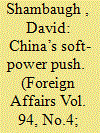

|
|
|
|
|
| Summary/Abstract |
As China’s global power grows, Beijing is learning that its image matters. For all its economic and military might, the country suffers from a severe shortage of soft power. According to global public opinion surveys, it enjoys a decidedly mixed international image. While China’s economic prowess impresses much of the world, its repressive political system and mercantilist business practices tarnish its reputation. And so, in an attempt to improve perceptions, Beijing has mounted a major public relations offensive in recent years, investing billions of dollars around the world in a variety of efforts.
|
|
|
|
|
|
|
|
|
|
|
|
|
|
|
|
| 2 |
ID:
139339


|
|
|
|
|
| Summary/Abstract |
The term “robotics revolution” evokes images of the future: a not-too-distant future, perhaps, but an era surely distinct from the present. In fact, that revolution is already well under way. Today, military robots appear on battlefields, drones fill the skies, driverless cars take to the roads, and “telepresence robots” allow people to manifest themselves halfway around the world from their actual location. But the exciting, even seductive appeal of these technological advances has overshadowed deep, sometimes uncomfortable questions about what increasing human-robot interaction will mean for society.
|
|
|
|
|
|
|
|
|
|
|
|
|
|
|
|
| 3 |
ID:
139345


|
|
|
|
|
| Summary/Abstract |
On March 17, Israeli Prime Minister Benjamin Netanyahu won reelection, thanks in part to a desperate last-minute pledge to his right-wing base that the Palestinians would never get a state so long as he was in power. After the election, he tried to walk his comments back, but Palestinian observers weren’t buying it. As one person close to the Palestinian leader Mahmoud Abbas put it, Netanyahu’s reelection marked the end of an era, “the final closing of the window of opportunity for a negotiated solution.” The insider continued: “Two years ago, [U.S. Secretary of State] John Kerry told the U.S. Congress that in a matter of a year and a half, or two years at most, the window will close. He was right. It’s over.”
|
|
|
|
|
|
|
|
|
|
|
|
|
|
|
|
| 4 |
ID:
139346
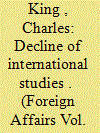

|
|
|
|
|
| Summary/Abstract |
In October 2013, the U.S. Department of State eliminated its funding program for advanced language and cultural training on Russia and the former Soviet Union. Created in 1983 as a special appropriation by Congress, the so-called Title VIII Program had supported generations of specialists working in academia, think tanks, and the U.S. government itself. But as a State Department official told the Russian news service RIA Novosti at the time, “In this fiscal climate, it just didn’t make it.” The program’s shuttering came just a month before the start of a now well-known chain of events: Ukraine’s Euromaidan revolution, Russia’s annexation of Crimea, and the descent of U.S.-Russian relations to their lowest level since the Cold War. The timing was, to say the least, unfortunate.
|
|
|
|
|
|
|
|
|
|
|
|
|
|
|
|
| 5 |
ID:
139348
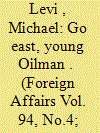

|
|
|
|
|
| Summary/Abstract |
Most observers agree that the United States, propelled by its boom in oil and gas production, is becoming increasingly central to global energy. As oil prices have plummeted, American oil producers have taken credit. As U.S. imports have fallen, foreign policy thinkers have suggested that Washington could rely far less on the Middle East. As U.S. firms have prepared to export liquefied natural gas (LNG), market watchers have braced for a transformation of global natural gas markets and, as a result, geopolitics. And as U.S. energy companies have begun to capitalize on shale gas and renewable energy to tame their reliance on coal, scientists have hoped that Washington might finally take the lead in combating climate change. But when future historians reflect on the ongoing transformation of the global energy landscape, they won’t focus narrowly on the United States: Asia will feature at least as prominently, and interactions between the two sides of the Pacific will prove most important of all.
|
|
|
|
|
|
|
|
|
|
|
|
|
|
|
|
| 6 |
ID:
139349


|
|
|
|
|
| Summary/Abstract |
Every month, nearly one million people flee their homes because of conflicts or natural disasters. With few wars ending, and new wars starting, the number of people displaced by conflict now exceeds 50 million. Not since World War II have people sought refuge—in their own countries or in neighboring states—on such a scale. The disorder driving mass displacement is unlikely to be transitory. In a growing number of countries, the glue of national identity and state authority is unable to patch ethnic, sectarian, or tribal divisions, all of which are exacerbated by regional rivalries. Faced with such threats, multilateral institutions may be strong enough to prevent interstate war but too weak or divided to stop the fighting, as is the case in Iraq, South Sudan, Syria, and Ukraine. Further adding to the tide of humanitarian misery are climate change and demographic pressures.
|
|
|
|
|
|
|
|
|
|
|
|
|
|
|
|
| 7 |
ID:
139342


|
|
|
|
|
| Summary/Abstract |
Ayaan Hirsi Ali is correct that darker passages of Islamic Scripture endorse violence and prescribe harsh punishments for moral or theological infractions. And she is right that in many Muslim countries, too many citizens still think it is a good idea to kill people for apostasy, stone them for adultery, and beat women for disobedience just because Scripture says so. But Hirsi Ali is profoundly wrong when she argues that Islamic Scripture causes Muslim terrorism and thus that the U.S. government should fund Muslim dissidents to reform Islam.
|
|
|
|
|
|
|
|
|
|
|
|
|
|
|
|
| 8 |
ID:
139344
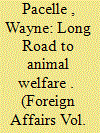

|
|
|
|
|
| Summary/Abstract |
On election night in November 1992, I waited anxiously with other animal welfare activists at the Radisson Hotel in Denver, Colorado, to learn the outcome of a statewide ballot measure to ban the baiting, hound hunting, and spring hunting of black bears. The initiative was a big deal both for me (it had been my idea) and for the animal welfare movement more generally. Colorado was a political redoubt for the National Rifle Association and other pro-hunting groups; if the ballot measure passed, it might inspire other reforms for animals, and if it failed, it might set the movement back years. Most of my fellow activists had been skeptical about the initiative, arguing that it was a fool’s errand because the hunting lobby was too strong to defeat. But the leaders of the Humane Society of the United States (HSUS—then as now, the largest animal protection organization in the country—had overruled their political staff and decided to support the effort, on principle. “It’s too important not to try,” John Hoyt, then the group’s president, told me. “If we lose, I want to be on the side of the losers.” In the end, we won big, getting 70 percent of the vote.
|
|
|
|
|
|
|
|
|
|
|
|
|
|
|
|
| 9 |
ID:
139340


|
|
|
|
|
| Summary/Abstract |
As advanced economies become more automated and digitized, almost all workers will be affected, but some more than others. Those who have what the economists Maarten Goos and Alan Manning call “lovely jobs” will do fine, creating and managing robots and various digital applications and adding lots of value in service sectors such as finance. Those who have what Goos and Manning call “lousy jobs,” however—in sectors such as manufacturing, retail, delivery, or routine office work—will fare less well, facing low pay, short contracts, precarious employment, and outright job loss. Economic inequality across society as a whole is likely to grow, along with demands for increased state expenditures on social services of various kinds—just as the resources to cover such expenditures are dropping because of lower tax contributions from a smaller work force.
|
|
|
|
|
|
|
|
|
|
|
|
|
|
|
|
| 10 |
ID:
139341
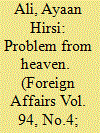

|
|
|
|
|
| Summary/Abstract |
We have a problem—not a problem from hell, but one that claims to come from heaven. That problem is sometimes called radical, or fundamentalist, Islam, and the self-styled Islamic State is just its latest iteration. But no one really understands it. In the summer of 2014, Major General Michael Nagata, the commander of U.S. special operations forces in the Middle East, admitted as much when talking about the Islamic State, or ISIS. “We do not understand the movement,” he said. “And until we do, we are not going to defeat it.” Although Nagata’s words are striking for their candor, there is nothing new about the state of affairs they describe. For years, U.S. policymakers have failed to grasp the nature of the threat posed by militant Islam and have almost entirely failed to mount an effective counteroffensive against it on the battlefield that matters most: the battlefield of ideas.
|
|
|
|
|
|
|
|
|
|
|
|
|
|
|
|
| 11 |
ID:
139350


|
|
|
|
|
| Summary/Abstract |
Most observers agree that the United States, propelled by its boom in oil and gas production, is becoming increasingly central to global energy. As oil prices have plummeted, American oil producers have taken credit. As U.S. imports have fallen, foreign policy thinkers have suggested that Washington could rely far less on the Middle East. As U.S. firms have prepared to export liquefied natural gas (LNG), market watchers have braced for a transformation of global natural gas markets and, as a result, geopolitics. And as U.S. energy companies have begun to capitalize on shale gas and renewable energy to tame their reliance on coal, scientists have hoped that Washington might finally take the lead in combating climate change. But when future historians reflect on the ongoing transformation of the global energy landscape, they won’t focus narrowly on the United States: Asia will feature at least as prominently, and interactions between the two sides of the Pacific will prove most important of all.
|
|
|
|
|
|
|
|
|
|
|
|
|
|
|
|
| 12 |
ID:
139336


|
|
|
|
|
| Summary/Abstract |
Robots have the potential to greatly improve the quality of our lives at home, at work, and at play. Customized robots working alongside people will create new jobs, improve the quality of existing jobs, and give people more time to focus on what they find interesting, important, and exciting. Commuting to work in driverless cars will allow people to read, reply to e-mails, watch videos, and even nap. After dropping off one passenger, a driverless car will pick up its next rider, coordinating with the other self-driving cars in a system designed to minimize traffic and wait times—and all the while driving more safely and efficiently than humans.
|
|
|
|
|
|
|
|
|
|
|
|
|
|
|
|
| 13 |
ID:
139338


|
|
|
|
|
| Summary/Abstract |
Belief in “the green light, the orgiastic future that year by year recedes before us,” as F. Scott Fitzgerald wrote in The Great Gatsby, is a characteristic American trait. But hope in a better future is not uniquely American, even if it has long been a more potent secular faith in the United States than elsewhere. The belief has older roots. It was the product of a shift in the temporal location of the golden age from a long-lost past to an ever-brighter future.
|
|
|
|
|
|
|
|
|
|
|
|
|
|
|
|
| 14 |
ID:
139343
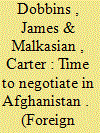

|
|
|
|
|
| Summary/Abstract |
Peace talks, if not peace itself, may be close at hand in Afghanistan. Over the past few months, Afghanistan, Pakistan, and the Afghan Taliban have made unexpected strides toward talks. In early May, members of the Taliban and the Afghan government even met in Qatar and expressed real interest in starting official negotiations—a heartening step.
|
|
|
|
|
|
|
|
|
|
|
|
|
|
|
|
| 15 |
ID:
139337


|
|
|
|
|
| Summary/Abstract |
The debate over what technology does to work, jobs, and wages is as old as the industrial era itself. In the second decade of the nineteenth century, a group of English textile workers called the Luddites protested the introduction of spinning frames and power looms, machines of the nascent Industrial Revolution that threatened to leave them without jobs. Since then, each new burst of technological progress has brought with it another wave of concern about a possible mass displacement of labor.
|
|
|
|
|
|
|
|
|
|
|
|
|
|
|
|
|
|
|
|
|